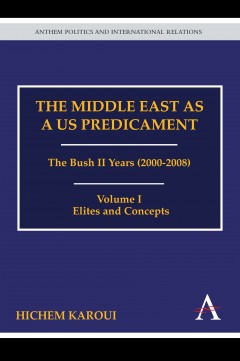The Middle East as a US Predicament: The Bush II Years (2000-2008)
Volume I. Elites and Concepts
By Hichem Karoui
Foreword by Arno Tausch
- About This Book
- Reviews
- Author Information
- Series
- Table of Contents
- Links
- Podcasts
About This Book
'Volume I. Elites and Concepts' examines the action and the doctrines of several US administrations in the Middle East, in order to pinpoint what went wrong in the relationships between them and the region. It shows how this regional subsystem is made in such a way that it constantly appears to seek sponsorship from an outside power. Analyzing the Bush Doctrine, this volume questions the absence of any sign linking the Doctrine to economical and financial motivations and to political and electoral issues, providinga comperehensive answer as to the public and real agendas. This study explains how Bush’s vision of the Middle East is identifiable to his network and not to be separated from the "laissez faire, laissez passez "ideology of the conservative right and its "moral bricolage"; in so doing, it gives an exhaustive account of the conservative and neo-conservative landscape and ideology, with a focus on the Middle East, along with a complete "Who's Who" of its leaders and organizations. The ideological connections between US and Israeli and Arab and Muslim conservatives are also scrutinized and compared, including think tanks, values system, corporative and political actors, attitudes and positions in the US and the Middle East, and similarities of approaches and recurrences, in order to reveal the sources of the influences exerted on Middle East foreign policy and the decision-making process.
Reviews
'A good example of 'American studies' in the classical sense of the word, combining insights from political science, sociology, history and economics. For any student of Washington decision making [...] this work may even be presented as a 'Who's Who in Republican America'.' —from the Foreword by Arno Tausch, Adjunct Professor of Political Science at Innsbruck University
'The author emphasizes the convergence of networks of politicians, businessmen and military personnel, in shaping that nucleus of social engineering in the USA and in the Middle East. The unlikely meeting of the 'Bedouin and the Cowboy' is at the heart of this system.' —Nilüfer Göle, Professor of Sociology, Director of Researches at the EHESS
'Quite remarkable. It is an undeniable contribution to the knowledge of US policy and the causes of its failures in today's Middle East, at a decisive phase of its history.' —Burhan Ghalioun, Professor of Political Sociology at Paris III University (Sorbonne Nouvelle), Director of the Centre d’Etudes sur l’Orient Contemporain (CEOC)
Author Information
Hichem Karoui completed his PhD in sociology from the University of Sorbonne, Paris, in 2009. He has previously worked as a writer, researcher, columnist, editor, and translator. His recent publications include 'Où Va l’Arabie Saoudite? (Where is Saudi Arabia Heading?)' and 'L'après-Saddam en Irak, les Plans, les Hommes et les Problèmes (Post-Saddam Iraq, Plans, Men and Problems)'.
Series
Table of Contents
Preface by Arno Tausch; Part One: The Concepts and the People; Chapter 1: The Problem: An Introduction; Chapter 2: Approaches and Definitions of the Middle East; Chapter 3: From Truman to Clinton, America and the Middle East; Chapter 4: Bush Doctrine; Chapter 5: Ideology of the Conservative Right; Chapter 6: Neo-cons; Chapter 7: The Sources of Influences Exerted on Foreign Policy; Part Two: The Networks; Chapter 8: Elites’ Networks; Chapter 9: Foreign Policy and Decision Making; Chapter 10: Israeli Network; Chapter 11: Arab Network; Chapter 12: American Muslims’ Network; Chapter 13: Entrepreneurs and Businessmen’s Network; Chapter 14: Military Network; Chapter 15: Conclusion; Index; Bibliography
Links
Stay Updated
Information
Latest Tweets



